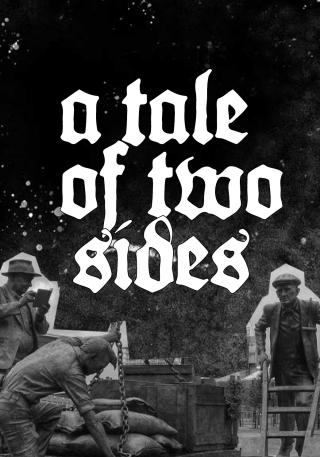Terry a local resident and citizen scientist from Custom House reflects on the obstacles to prosperity in the area despite the regeneration plans in the last two decades.
These are the messages, thoughts and findings of Terry, a local resident and citizen social scientist from Custom House, Newham. Terry conducted research on the obstacles to prosperity that local residents in Custom House experience, as part of the Prosperity in east London 2021-2031 Longitudinal Study.
Broken promises
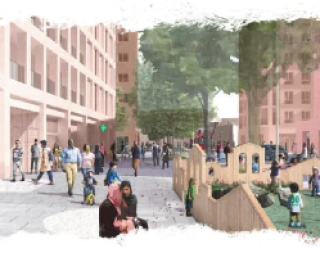
Mock-up of the Custom House regeneration plans promised in the early 2000s
In 2001, plans to regenerate the Custom House estate were first shared with residents. The plan was part of the broader “Custom House and Canning Town Regeneration” initiative, involving 19 different areas, which promised to transform the area and improve quality of life for residents. Although some regeneration has already occurred in parts of Canning Town, Custom House remains little changed if not worse.
The shops along Freemason’s Road have had the same structure since the 1990s. Now run-down and in disrepair, few stores remain. Most have moved out or shut down. Houses in the estate similarly reveal years of neglect - the result of limited repairs, poor maintenance, and a lack of renovation.
When asked why the promises of regeneration had failed to reach Custom House, Terry explained:
““I think the first time they tried to take on more than they could chew...but they tried to just get people out first. It left people in a lot of uncertainty - people don’t want to set roots, buy new stuff or spend money decorating if you’re going to be moving out. And because of the regeneration - they’ve started doing some things now - but the council was slow on repairs. And then it was Mears that ran it - private renters who have got chucked off by the council since - but Mears were not short of abusing people, charging over-inflated prices, people were living with dirt coming out their taps, windows falling out. [The council’s] addressed some of it now but they were putting a hold on repairs because they say it comes out of a different pot of money. But the way it seems to me, they didn’t want to spend money on a place that potentially would come down. So the more it was the left, the more it got run down. There’s probably numerous reasons for it - finances, people’s demands - but I think one of it was actually the original plan was just over-done and they should have realised that and talked to people, let them have an input on how it would proceed, instead of bulldozing ahead.”
“Is a promise that lasts 20 years still a promise?”, Terry asks.
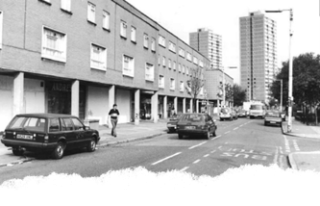
Freemason’s Road, 1990s
Across the bridge
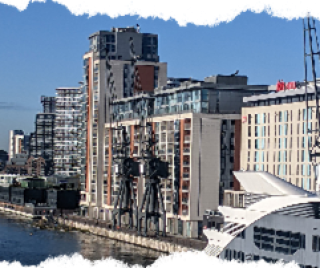
Hotels lining the Royal Victoria Docks
As infrastructure and amenities in Custom House have fallen into disrepair over the years, residents have simultaneously seen the rapid development of the Royal Victoria Docks just across the Custom House DLR bridge. Terry describes this in detail:
““Across the bridge you will see a completely different world. New buildings, clean streets, and the greatest security. A resident once saw a fight start on the other side, in less than 5-minutes ExCel1. security had diffused the situation; I can empathize with my fellow residents when they say we feel like we do not exist. The Custom House community have been forgotten.”
Residents lamented the stark contrast between their estate and the relative wealth, safety and modern amenities just across the bridge. Despite vague promises that these mega developments would benefit the community, Terry pointed out that they had failed to create jobs for the community. Most events at ExCeL, for instance, outsourced their staffing needs to agencies. Training opportunities to work in the hospitality and events sector were also not made available to residents, making it difficult for them to access what opportunities they could find.
This lack of consideration for the local community in Custom House also extended to the way estate regeneration initiatives were carried out. For instance, Terry recalls how the allotment in Custom House had been prematurely shut:
““It was used by the community a great deal, it was all looked after and taken care of, but about 2-3 years ago it was shut down - it was earmarked for regeneration. They said you’ve got to give people a lot of notice and you might as well vacate it now because if people dig their heels in further it’s more difficult to get people out. I disagree with this and obviously they didn’t keep the time, it overran. So it’s just been sitting empty. And then because of that, you had more people starting fires there, drug abuse, people sleeping in tents, causing trouble. I just don’t see the sense in shutting something so early, which was so pivotal to keeping the community together. It was good for their mental health. People could’ve done a lot of things with it, especially with today’s problems - people struggling to get food - an allotment would have been great for the community.”
As Terry points out, crime and dwindling support networks that helped with food security and mental health were linked to the loss of important community space in Custom House. Communities know this and live this reality - they know the assets in their neighbourhood and the opportunities needed. Yet, they were not listened to in the regeneration planning. As Terry frequently urged: “Listen to the people, find out what they want”.
Lost futures
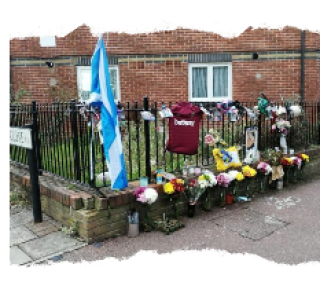
A memorial to a young man who was killed in Custom House
The sense of loss that residents of Custom House felt extended beyond amenities and opportunities, to communities and lives. Walking around Custom House, Terry pointed out multiple roadside memorials mourning the deaths of young people killed in violent crime.
Although crime levels have gradually gone down over the years - from 645 reported crimes in the second quarter of 2020 to 464 in the same quarter of 2022 (Metropolitan Police 2022) - crime and death are still a visible and daily reality. Poor future prospects and the uncertainty of having to move make it difficult for young people to thrive in school and envision alternative life paths. Crime seems to become the path of least resistance. Terry describes this situation:
““When you come from a run-down area, there’s no money being put into it, people don’t feel they have a future. They turn to a quick-and-easy way to get money. And a quick-and-easy way to get money is crime and doing things like muggings... and it hasn’t helped - the regeneration and the uncertainty of not knowing what’s going on hasn’t helped. People come to me all the time and they ask what’s going on, when’s my place coming down? And kids’ education and stuff like that suffers.”
Communities suffer too. Terry describes the cost to the Custom House community that decades of failed promises and neglect have incurred:
““No one’s got any vested interest in staying in the area, because they’re not sure what’s happening. So how can you build a community on uncertainty? Over the years there have been so many short-term lets, council’s letting private companies like Mears overcharge people - for a normal place that cost £600, charging £1,100 a month - of course people can’t make rent! And then there’s such a steady stream of people moving in and out...When we moved in here, every family was a council resident, every family was invested in the area long term, but now, from a street of about 28 houses - me knowing every one of the houses - I now only know about 16. And that’s the cost of this - communities are breaking down.”
While conducting research in Custom House, Terry and his research partner, Twinkle, met the father of a young boy who was killed just a few minutes’ walk away from Freemason’s Road. He urged them to be careful of who their children mixed around with. As Terry explained, this task becomes much harder in an environment of degeneration and uncertainty, where rooted communities are difficult to build and positive communal spaces for young people hard to find. When communities suffer, individuals suffer too.
In conversations about Custom House, Terry frequently spoke of futures - “it’s all about people’s futures” - what futures are being built for the people of Custom House?
If you could speak to a policymaker now, what would you say?
““Listen to the people first, find out what they want - don’t assume to know, get people involved.”
Terry
“Crush humanity out of shape once more, under similar hammers, and it will twist itself into the same tortured forms”. Charles Dickens, A Tale of Two Cities
 Close
Close


